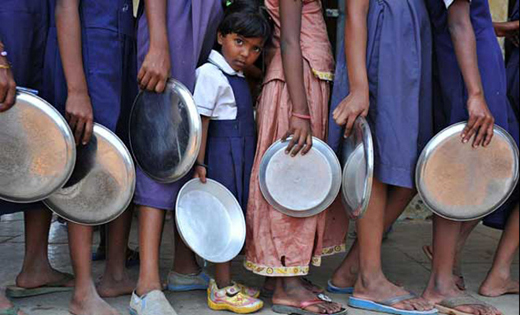
Patna, Jul 26: More than 1.5 crore schoolchildren in Bihar were not served their midday meal on Thursday after nearly three lakh government teachers washed their hands off the centrally-funded scheme on the grounds that it constituted non-academic work.
The programme meant for the poorest of the poor children for whom one meal a day is incentive for attending school is in jeopardy with the teachers' trenchant stand. Bihar Primary School Teachers' Association president Brajnandan Sharma said all the three lakh members of the association kept off the midday meal duties on Thursday and would continue to do so forever.
The Union government scheme is run in Bihar's 70,200 schools, benefiting over 1.5 crore students. Alarmed, Bihar's principal secretary (education) Amarjeet Sinha said the situation is being monitored. "The scheme is being implemented at the directive of the Supreme Court. How can anyone boycott duty suddenly?" Sinha told reporters.
"Repeated requests to the government to remove primary teachers from midday meal duty fell on deaf ears," said association general secretary Mahendra Sahi. "The Saran school principal was wrongly framed in the criminal case relating to the July 16 tragedy," he added, asserting they would not do any non-teaching work now onwards.
Students in several places were seen carrying lunch boxes from home, not sure whether they would get their meal. Bihar mid-day meal director R Lakshmanan admitted to news agencies that teachers' boycott would mean lakhs of children will return from school without having food. "We had appealed to the teachers to cooperate in running this scheme," said Lakshmanan.
While NGOs were being roped in to take over MDM's implementation in Patna and Muzaffarpur, education minister P K Shahi said it was difficult to arrange for a single agency to run the scheme in the state's 70,200 schools. "The government doesn't have the resources to hire an agency for the huge task of serving midday meals to 1.50 crore students," Shahi said.
The teachers' resolve notwithstanding, primary education director Ajay Kumar Chaudhary claimed the standoff would be resolved within a few days.
"Local arrangements have been made for the scheme to run - for now," Chaudhary said, adding there were school management committees comprising parents, civic body representatives and others, for supervising the scheme.
Last Saturday, a forensic science laboratory report confirmed the presence of toxic insecticide strains in the cooking oil used for making food at the school where the children died.
The poisonous substance for pest control, organophosphorus, which are degradable organic compounds, in oil samples collected from school was more than five times the commercial preparation available in the market, police said.





Comments
Add new comment